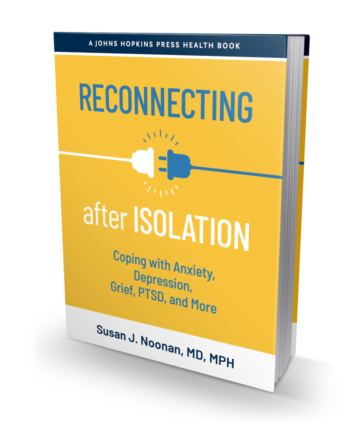 If you asked any one of us, we would say that top on our list of what we want is to feel better. But what is “better”? To most it means that the symptoms of depression have gone away. However, just the absence of symptoms is not enough to feel well. Being well is not only freedom from the episodes of a mood disorder or depression symptoms. It’s an ongoing process that includes participating in the world around you, being in control of your life, having a sense of personal growth and relationships that matter. It means that you have a sense of competence and mastery in the things you do in your life and that you feel good about who you are. How do you get there?
If you asked any one of us, we would say that top on our list of what we want is to feel better. But what is “better”? To most it means that the symptoms of depression have gone away. However, just the absence of symptoms is not enough to feel well. Being well is not only freedom from the episodes of a mood disorder or depression symptoms. It’s an ongoing process that includes participating in the world around you, being in control of your life, having a sense of personal growth and relationships that matter. It means that you have a sense of competence and mastery in the things you do in your life and that you feel good about who you are. How do you get there?
There is an interesting professional article by C.D. Ryff from the University of Wisconsin-Madison (2014) that discusses psychological well-being. In the past psychologists thought of well-being as happiness, satisfaction with life, and a positive affect (similar to mood). Thinking about well-being in deeper terms, Ryff describes the essential features of well-being which I will summarize for you here.
What are the components of well-being? First is having a purpose in life, where you feel your life has meaning, purpose and direction. You might find this as a working or volunteer person, student, parent, or whatever it is that guides you. It’s something that’s easy to forget when we are depressed, so you do have to work on it. Next is whether you are living a life based on your own personal convictions, beliefs, opinions, and principles. You are free to make decisions for yourself (that is called autonomy). For example, if you are an adult, do you feel controlled by another person? The third feature of well-being is making use of your personal talents and potential, called personal growth. This could be in your work, school, volunteering, or family life. Another feature is how well you are managing your life situations, the ups and downs of daily life, called mastering your environment. We all have fluctuations: the key is how we learn to deal with them.
The fifth feature of well-being is in having positive relationships, with deep ties to others. It could be with friends or family members, just as long as you have close personal connections. That is very important to maintaining your mental health balance and definitely helps with depression, a time when isolation can occur. The last is self-acceptance, which means having knowledge and acceptance of who you are, including your own personal limitations. Nobody’s perfect – we all have our strengths and weaknesses, and do better when we learn to accept and work with them.
This list must seem daunting! How in the world can I be well if I have to achieve all of these things that are difficult for anyone to do, let alone someone with a mood disorder? Good question! It’s not the kind of thing that happens overnight; it takes a lot of time and effort on your part. And you don’t have to master them all, certainly not all at once. Begin by having a conversation with your therapist about this and try to identify one or two areas in your life from this list that you want to work on. Then put those two areas into a clearly stated goal. Having a goal set in this way helps you to achieve the kind of life you want. Understand what you have have going for you that will help you, such as your strengths, and what you might have to change about yourself and your world to reach this goal. Try to identify how you personally impact the situation and potentially get in the way of reaching your goal. Is it negative thoughts you may have? Are there barriers that exist to achieve your goal? Find a way to work around them. Make a list of the first 3-5 steps to reach your goal. Stay focused on the goal and not how difficult it is. Care for yourself as you work to achieve it.
For example, your goal might be purpose in life and personal growth as a musician. You might state it as “I want to improve my skills as a musician and get more professional gigs. That will make me feel good about myself, bring people pleasure, and earn some money to support myself.” You might then identify that you are not always consistent with practice time, and feel shy about going out and promoting your musical performance. Neighbors might complain about hearing you practice. Thinking about it, you may identify one or two negative thoughts you have about your skills (I’m not very good” or “Nobody will hire me”) that are behind these behaviors. Use CBT to challenge those negative thoughts and behaviors and replace them with more realistic thoughts. Then think of your strengths, of past successes you have had in this area, and use these to boost your confidence.
Next make a to-do list of what steps you might take to make this happen, and who can help support you in this. That might include: set aside a specific practice time and place each day; take a music lesson(s); make a CD of your performance and bring it around to a few places where you want to perform; put a small sample of your music on social media to attract audience members , such as YouTube, Facebook, LinkedIn, Twitter; make attractive posters to promote your skills and performance dates; put the posters on social media and hang them up in a few select areas around your town announcing your performances and availability. It’s a lot to do when depressed; have a friend help you. Do these one-at-a-time, so you don’t get overwhelmed.
It is possible and realistic for those of us who have depression to expect wellness. This I know. I have lived it.
This blog was previously posted, in modified form, on my website www.susannoonanmd.com.
